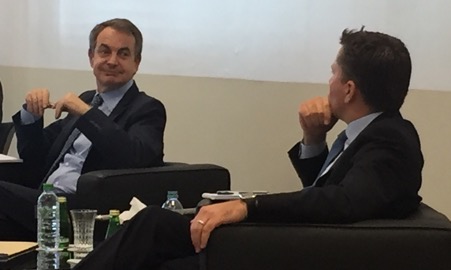- Posted on : April 24, 2016
- Posted by : Tom Fletcher
It was great last week to be part of former Prime Minister Zapatero's visit to the Diplomatic Academy, and to host his masterclass with students.
I can remember clearly PM Zapatero's arrival in power in Spain. He was one of a series of charismatic, fresh centre left leaders who swept to office by connecting in fresh ways - in some ways a successor to PM Tony Blair and a predecessor of President Obama and now PM Justin Trudeau. Like them he also faced in office the challenge of meeting high expectations, the realities of economic uncertainty, and the spectre of extremism.
When in Downing Street, I took part in meetings between Zapatero and three different Prime Ministers - a diplomatic Triple Crown. He was a crucial player in the rebooted G20 during the international financial crisis. He bonded with Gordon Brown over the domestic economic agenda and housing stats. Leaders I observed obviously talked to each other about foreign policy. But when they really got on, they talked domestic policy and politics. Zapatero was then in office when the UK coalition government was elected in 2010. I went with Nick Clegg to meet him on the DPM's first overseas visit - they spoke in Spanish, so I'm not sure I was much help. Zapatero was as perplexed as Angela Merkel and Nicolas Sarkozy that UK officials could survive changes of government.
As a former private secretary - the clue is in the first part of that title more than the second - I can't comment on confidential diplomatic exchanges, of which there were many with PM Zapatero and his team during my time at No 10. But I hope two anecdotes don't break the Official Secrets Act, and demonstrate some practical diplomacy.
During the icy Winter of 2008, the media was hammering the government - in the circular firing squad style that characterises much debate in the UK - over a lack of salt for the roads. We had grit. But inevitably it was the wrong kind of grit. Someone worked out that the closest salt was in a ship off the coast of Spain. I called Zapatero's brilliant chief of staff, Bernardino Leon. An hour later, the boat was on its way.
In January 2009, as the financial crisis raged, the UK convened the G20 in London. This was a pretty grim backdrop - many of those present knew that the economic meltdown meant they would not survive long in office. The key discussion between leaders took place the night before the main summit, in the old dining room of Downing Street (under the watchful eye of former Prime Ministers). Only heads of government were present, but I remained in the room just in case.
Meanwhile, various World Cup qualifiers were taking place. Pre smartphone, the leaders had no means of getting updates. Some - Zapatero, Lula in particular - became increasingly restless. So I had scores brought into me, with a bit of theatre. The leaders would try to catch my eye to get the latest update, but I'd agreed with the PM not to break up the discussion until they had signed off key elements in the communique. As each spoke, I would then sidle over and let them have their score. A creative form of diplomatic leverage.
Zapatero spoke at the diplomatic academy about the lessons for diplomacy of his time in office. Students now on the frontline of the Middle East's battle for tolerance and coexistence heard how he used the power of ideas and communication to take on terrorism at home. He argued eloquently that in diplomacy - as in politics - you can only convince others if you are first convinced yourself. He described, ahem ... diplomatically, UK hospitality as 'austere', and correctly suggested that speeches written by diplomats could generally be improved by removing the first four paragraphs. He thought that most diplomatic speech writers were worn out after a year.
Many of the challenges of the 2000s are of course still with us - climate change, Mediterranean migration, Palestine/Israel, economic uncertainty. But diplomats and the politicians they serve can draw on much of the same armoury - creativity, flexibility, respect, courage, openness and authentic communication. Plus, as Zapatero stressed, humility. When too many of those seeking office do so by promising walls, it is refreshing to hear some ex leaders talking about building bridges. As leaders get younger, and therefore ex leaders get younger, there is no handbook for being a former head of government. But those bridges are a pretty good place to start.
0 Comments

